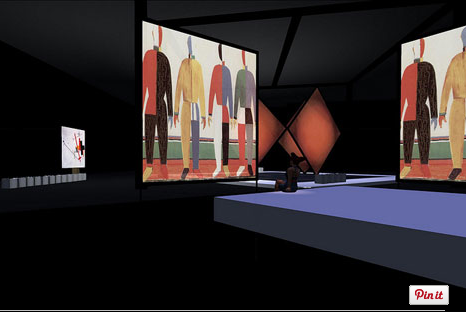Highlights of the UK-Russia Year of Culture unveiled in London
Dec 28th, 2013 | By Ivan Lindsay | Category: Journal
2014 is the official UK-Russian Year of cultural exchange, an initiative signed by William Hague and his Russian counterpart Sergei Lavrov in March 2013. Despite some diplomatic tensions over the last few years over 500,000 Russians have made England their home citing reasons such as safety, good schools, mild climate and sea air. High spending Russians in London attract most of the press but there are also many less rich Russians to be found across the UK working in a wide cross-section of professions. It is hoped that cultural exchange from over 250 planned events can help build trust between the two countries. Events will include art, music, opera, film and ballet and are being coordinated between the Russia Embassy, the Russian Federation Office of Social Affairs, the Embassies and the British Council.
An overview is reproduced below from ‘Russia – Beyond the Headlines.’
Highlights of UK-Russia Year of Culture unveiled in London – Tatiana Rubieva, RBTH
The initial programme of the UK-Russia Year of Culture 2014 has been unveiled, with many initiatives in store for British fans of classic and modern Russian culture.
Speaking during the programme’s launch in London on Thursday, President Putin’s culture envoy Mikhail Shvydkoy said British culture is also “very important and very popular” in Russia, and he hoped the project would help the two countries build trust.
“We have a very long history. A lot of misunderstandings, between states, between special institutions…,” said Mr Shvydkoy. “So culture must create a new mutual understanding between us.”
The cross-cultural year will kick off in London on February 24 with a concert of the Big Symphony Orchestra, under the direction of famed conductor Vladimir Fedoseev. It will be followed by the formal programme opening in Russia on April 14, with British director Peter Greenaway bringing multimedia exhibition “The Golden Age of Russian Avant-Garde” to an iconic Moscow venue – the Manege exhibition centre.
The program was presented at London’s Science Museum, which will host one of the highlights of the Year next October – a display of space artefacts from Russia. “In the history of civilisation and archaeology, people still talk about the Tutankhamun exhibition [at the British Museum in 1972], but for people in the history of science, telling the Russian story of the space race is just as important. We’re borrowing objects that have never left Russia or been seen in public in Russia itself,” the director of the Museum, Ian Blatchford, said.
Among other key events from the UK programme are a display of works by Kazimir Malevich at the Tate Modern, as well celebrations to mark the 200th birthday of Russian poet Mikhail Lermontov and commemorative initiatives for the 100th anniversary since the start of the World War I.
In turn, Russia will play host to the recent Barbican exhibition Designing 007: Fifty years of Bond Style, displays on British art from the 1990s and fashion in film, and theatre productions by UK companies in celebration of the 450th anniversary of Shakespeare’s birth.
Two websites detailing the wider programme in each country are set to go live in January.
Deputy prime minister for social affairs of the Russian Federation Olga Golodets, currently overseeing the project on the Russian side, emphasised that the program also focuses on cultural exchanges between Russian and British teachers, students and scientists. She revealed that in February the Victoria and Albert Museum (V&A) in London will host a seminar on future trends in arts and science. The event will see the participation of famed British physicist and Nobel Prize winner Peter Higgs.
According to Golodets, cultural ties between Russia and Britain have been successfully developing over the past few years, even despite all political disagreements. One example of this is the recent collaboration between the Moscow Kremlin Museums and the V&A. “Our English counterparts even changed the legislation to guarantee the safety of these unique pieces (from the Moscow Kremlin collection, Ed.),” said Golodets.
She also remarked that generally the effect of such large-scale projects is very positive.
“We expect the UK-Russia Year of Culture to bring quality changes to our relations, bring us closer and establish direct contacts between specialists in various areas. We have already seen examples of that. After our Russia-China Year of Tourism the number of Chinese tourists coming to Russia has increased by 46 percent”, Golodets said.
Highlights in UK:
•Russia’s Space Quest (working title), Science Museum
•Russian Philharmonic Orchestra concert conducted by Dmitry Yurovsky at the Royal Festival Hall
•Kazimir Malevich at Tate Modern
•Tchaikovsky Symphony Orchestra concert conducted by Vladimir Fedoseyev
•Stanislavsky and Nemirovich Danchenko Moscow Musical Academic Theatre
•Days of St Petersburg, Scotland
•Sretensky Monastery Choir at Kensington Place
•International Chekhov Festival in Edinburgh and London
Highlights in Russia:
•Designing 007: Fifty Years of Bond Style at Moscow Multimedia Art Museum
•Challenging Boundaries: Breakthroughs in British Art, 1988-1998 at the Ekaterina Foundation
•British Theatre Seasons by UK theatres
•Dressing the Screen: The Rise of Fashion Film
•Northern Island Opera – The Turn of the Screw at the Novaya Opera
•National English Language Olympiad
•London Philharmonic Orchestra – Britten’s War Requiem at the Rostropovich Festival
•Hitchcock 9 – Screenings at Strelka backed by live music
•The Golden Age of Russian Avant-Garde at Manege. Curated by Peter Greenaway
•Researcher Links. Mentoring young scientists from Russian and UK
•Exhibition of Wedgwood Pottery at the All-Russian Museum of Applied and Folk Arts
For more information visit the website of the British council.
For the full article http://rbth.co.uk/arts/2013/11/15/highlights_of_uk-russia_year_of_culture_unveiled_in_london_31751.html




